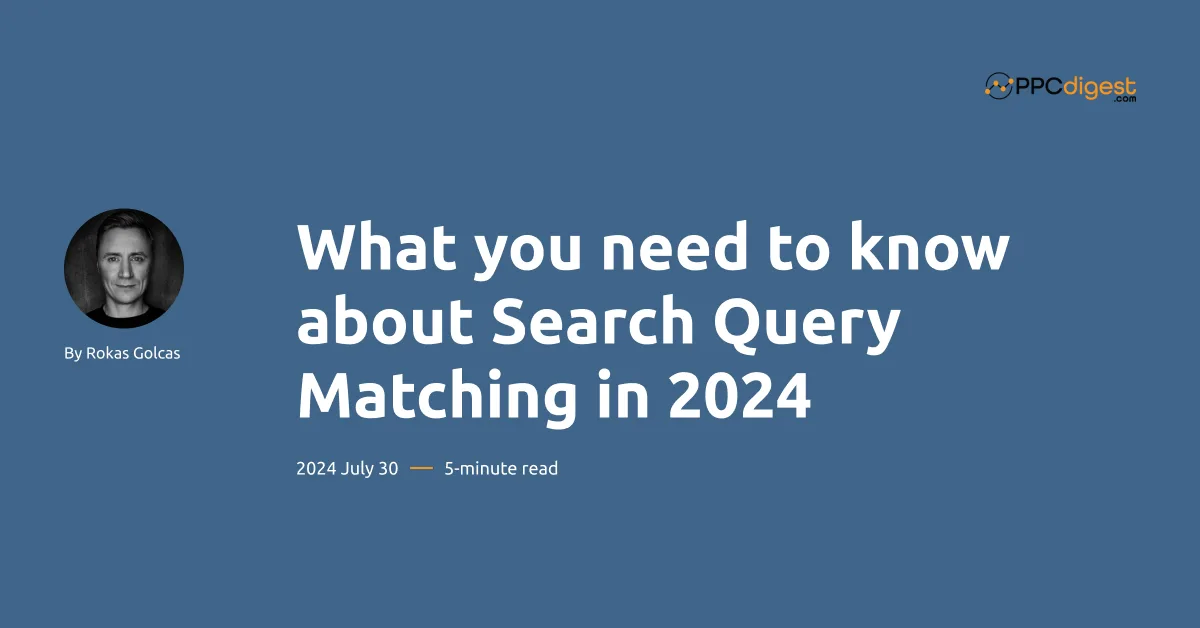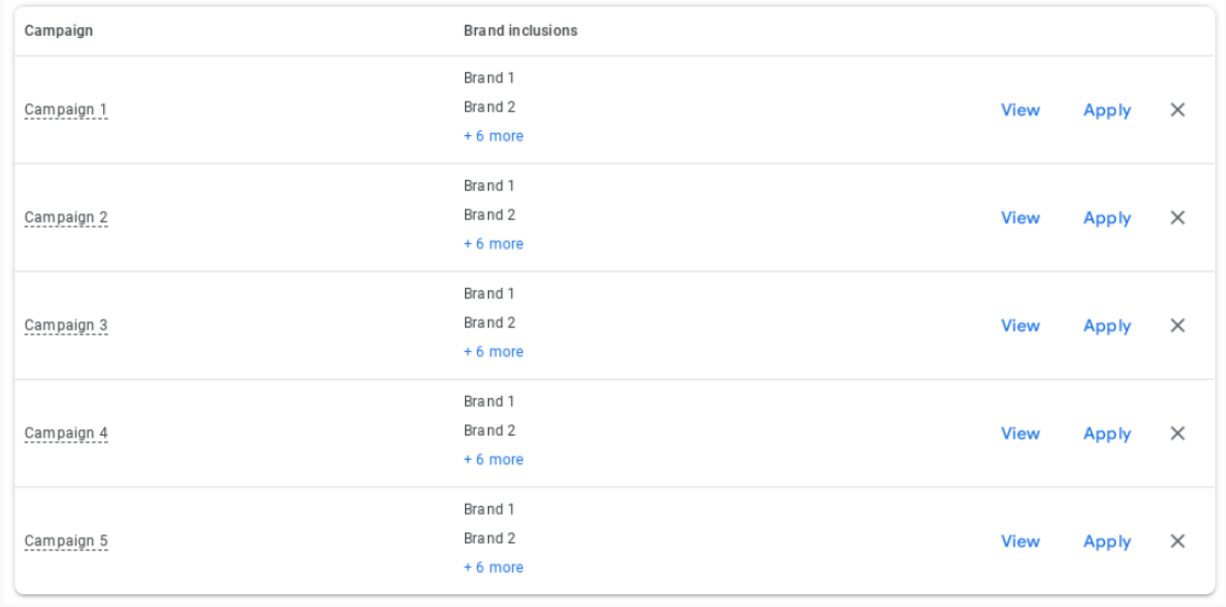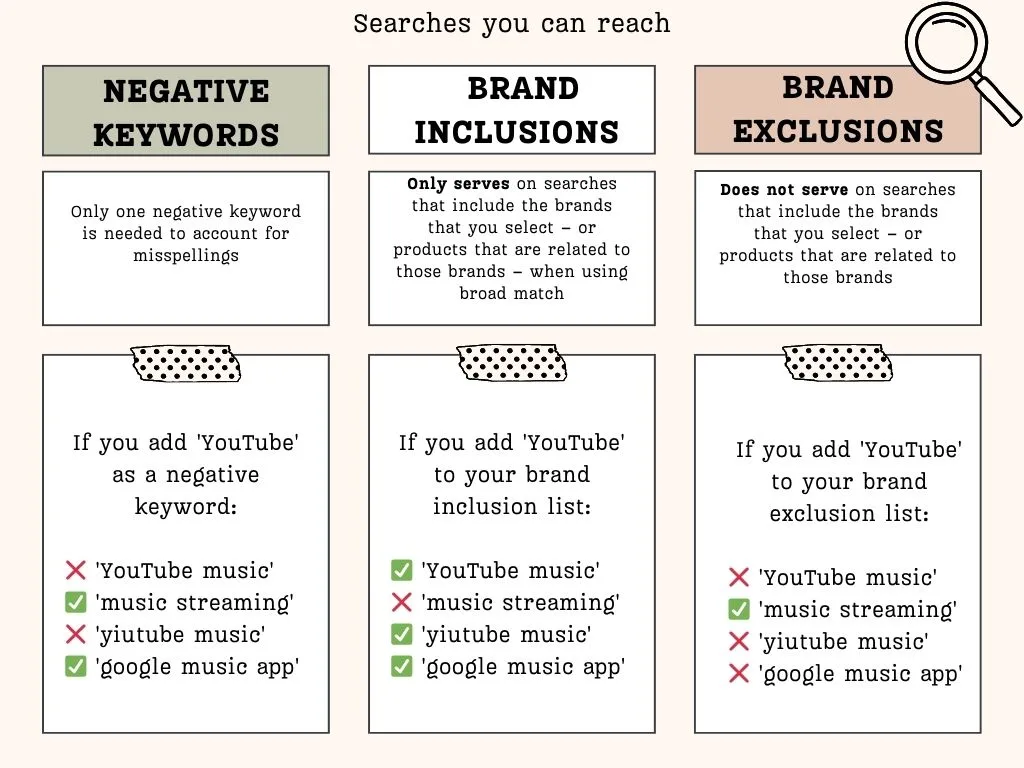
In recent years, Google Ads has changed its keyword rules. It added and then removed the modified broad match type. It also introduced close variants for exact matches and altered phrase matching. These changes have impacted Search campaign performances.
And now another change. Google announced what will change in query matching, and you need to take that into consideration. Let’s go over what exactly has changed.
Brand inclusion and exclusion lists
Brand inclusions
The first change will affect brand inclusion lists for broad match campaigns and keywords. Brand keywords are valuable and specific. In contrast, broad match keywords often link to unrelated queries. Without brand inclusion lists, your brand keywords might show up in unrelated searches.
I wrote about brand inclusions and exclusions if you don’t know what they are.
What will happen now is that Google will start suggesting which brand inclusion lists you should apply to a campaign in the Recommendations tab.

Remember that your campaign has to be a broad match campaign. This means you might get more traffic due to how broad match works. For now, we don’t know how brand inclusions work, how accurate they are, and so on. So, you might end up spending more on your brand campaigns. For this purpose alone, you should test it and not just blindly switch.
Brand exclusions
The second change is for the brand exclusions. From now on, brand exclusion lists will be available for all match types and Dynamic Search Ads campaigns. It should be available in the coming months.
If you add a brand to your exclusion list, it will also block traffic from brand misspellings and other variants.
This is especially great for e-commerce sites using dynamic search ads because the search queries are based on the products on the site. Excluding some of the brands might help you better optimize your campaigns. However, always monitor how your campaign performs after the exclusions. You don’t want to miss those extra conversions.
Updates to query matching for misspellings
Google introduced two significant changes.
First, now you can see data on misspelled queries in your search term report. They will be grouped under the correct spelling keyword.
I haven’t noticed it yet, but I’m sure it varies per account. If you’ve noticed that you see more keywords, let me know.
Second, Google now applies misspellings to negative keywords as well. This saves a lot of time.
Misspellings in search term report
Misspelled words are common, at least in my blog posts, lol. I remember we used to add misspelled terms (especially brand terms) to the campaigns for full coverage. After the close variant matching update, this was no longer needed.
🤯 Did you know that there are at least 1.5 million ways to misspell ‘YouTube’ on Google.
Previously, misspellings in your Google Ads search term report were labeled as “Other” due to privacy rules. Now, they will be categorized under the correct spelling keyword. There won’t be extra entries, but the data will be combined.
According to Google, on average, 9% of search terms previously under ‘Other’ due to misspellings in the search terms report are now visible.
Misspellings for negative keywords
This is the change I love. Before, we needed to add misspelled keywords as exact or phrase matches if we wanted to exclude them. Well, not anymore. Now you can only exclude the correctly spelled keyword, and it will cover all the misspellings.
Here’s an example with “youtube” keyword.

In my experience, misspellings can be costly. This will definitely help with avoiding those lower-quality clicks. And at the same time you won’t need to add as many negative keywords.
This is great, as Google usually tries to hide stuff from us. However, these changes can significantly impact your campaign performance without you spending too much time on it.
Here’s the table to better understand the differences:

Whenever you’re ready, there are 3 ways I can help you:
- Book a call with me. During a 1-hour call, we can go through your account and identify growth opportunities or do a quick audit to see what can be improved instantly. Short call, big gains.
- Get my book “The Google Ads Playbook”. It’s almost 300 pages on how to create, manage and optimize campaigns. If you’re just starting out, you will get massive value out of it. No fluff. No BS. No basic information. Nothing held back.
- Subscribe to my FREE weekly newsletter. Don’t miss new articles. Get them straight into your inbox.
I share weekly tips on how to create, manage, and scale Google Ads campaigns. Subscribe to my free newsletter.
I’m also down with connecting on LinkedIn.
Or follow me on X, for some quick updates and fast insights.